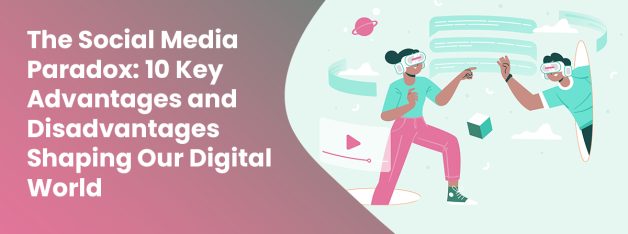The Social Media Paradox: 10 Key Advantages and Disadvantages Shaping Our Digital World

Facebook, Instagram, Twitter, and LinkedIn are the most vital aspects of our digital world. No other platform allows for branding, sharing of knowledge, or real-time engagements. However, there is no other way to realize that social media has altered communication, business, and society; the very medium of communication itself has also been impacted through the way people communicate, the way brands market themselves, and the way news spreads.
However, the cost of digital growth is the digital intensity affecting the lives of people daily.
The Social Media Double-Edged Sword
Social media is like a highway. It gives rapid connections, easy access to information, and boundless opportunities to explore. Without traffic rules, it leads to congestion, misinformation, and collisions.
Social media is very powerful according to how one uses it. Used in a wise manner, it becomes an excellent tool for personal and professional development. Misused, it becomes a source of distraction, stress, and misinformation.
10 Advantages of Social Media
1. Connecting distance between people
With social media being free of a geographical bound, it would be easier to reach family and friends and people at work, in case a person needs it. The most efficient and quality means of catching up would be through instant messaging or video call regarding getting the update.
A New York professional can know about what his family is up to in Mumbai. He can maintain close, despite the physical distance otherwise being hugely vast, by virtue of the WhatsApp updates and Instagram stories.
Why it matters: It brings both personal as well as professional relationships closer and stronger due to instant connectivity
2. It is a launchpad for Brand Building
The most successful small business and big business can create a social media presence for the purpose of getting out there to sell to customers, levelling the playing field for the startups so any amount of an advertising budget can connect with its audience.
For example, a new skincare brand can build its brand on Instagram by an influencer and its customers’ testimonials through videos. It does not need to open up a storefront to be noticed.
Why it matters: Social media enables business growth organically with added trust with the target audience.
3. Expanding knowledge and learning opportunities
The web is an information hub. It allows a social media user the opportunity to upgrade oneself by having access to information about the industry, expert opinion, and even content. What one learns is about his profession with LinkedIn; free tutorials pop up on YouTube for a student, and for a researcher, findings are being disseminated in Twitter.
Consequently, the opportunity for lifetime learning-from new language mastery through monitoring market trends- exists for one on social media.
Why it matters: It is a dynamic tool for skill-building and professional development in the digital sphere.
4. Correct Advertising through Paid Advertising
In contrast to the traditional advertising mode, Google Ads and social media advertisements allow businesses to target demographics based on interest, location, and online behavior.
For example, a sports brand can utilize paid marketing for reaching users who have been interacting with workout pages or are presently searching for running shoes. That is a level of accuracy by which businesses provide the right message to the right people.
Why it matters: Targeted campaigns mean that businesses ensure their marketing budget reaches maximum conversion rates.
5. Real-Time Customer Interaction and Feedback
It would be possible to allow brands direct contact with the audience through social media. Such can be an example as straightforward as responding to a customer’s complaint on a comment on either Instagram or on a tweet; a business fosters its relations in real time.
This implies if it managed to resolve an issue of a guest about its hotel on social media, then that’s said to have been transparent with and cared about the customers; hence, its reputation increased.
Why it matters: This is important because speedy response results in loyalty and healthy perception towards the brand.
6. Social Movements and Global Awareness
Social media has brought much effort toward change from climate activism to women’s rights and mental illness awareness.
As it has been proved through the influence of #MeToo, that is making the dialogue about workplace harassment mainstream, thus changing policies and the consequential legal action around the world.
Why does it matter: Such a wonderful source of strength is to pass on knowledge and to motivate through awareness; therefore, social media is the reason for opinion-making voice.
7. Playground of Creativity in Self-Expression
Whether photography, music, writing, or video production, social media is the place for creative talent. From TikTok, YouTube, and Instagram, the audience can find everything. And the beauty is that the person need not depend on the gatekeepers.
Take an independent filmmaker. They can upload their short films to YouTube without studio support.
Why it matters: Social media democratizes creativity by breaking the walls of industries.
8. Career Development and Professional Network
LinkedIn platforms have changed how people are searching for jobs and getting professional networking. People can easily find mentors, become friends with professionals in their line, or get information on available jobs based on skills.
A graphic designer can post a design on Instagram, from there start taking freelancing work with clients from overseas.
Why it matters: Social media enhances professional development due to ease in networking.
9. Access to Breaking News and Information
Social media makes sure breaking news spreads faster than ever by updating users with any breaking situation. This gives little room for disputing the truth about misinformation.
With the update one gets about the global happening in real-time through the use of Twitter, it should always verify its sources so that it does not consume false material.
Why it matters: Social media will continue to keep the users updated, but these news items will have to be used responsibly now with critical thinking.
10. Consumer reviews and Trust indicators
What drives up the purchase is consumer reviews. A customer reads peer feedback to buy a product. Thus, social proof has emerged as such an important success variable for the brands.
A hundred positives on an Instagram of an e-commerce store might attract more customers than one who has no engagement at all
Why it is important: Positives and recommendations build brand authenticity.
10 Downsides of Social Media
1. Privacy Issues and Data Theft
Too much exposure of personal information on social networking sites leads to identity theft, hacking, and misuse of data. Many collect user data, which raises a concern about the violation of privacy.
How to check: Keep updating the privacy setting and don’t post any sensitive information in public.
2. Effect on Mental Health
Excessive social media usage is linked to anxiety, low self-esteem, and depression. Unattainable perfection on social media fosters unhealthy comparisons in reality.
How to reduce it: Breaks and watching positive and informative content will create a healthier digital experience.
3. Spread of Fake News
Social media generates fast spreading lies that help one decide on opinions even before information is digested. This may bring very disastrous influences into things like health, politics, and global issues.
How to minimize it: Always verify the source before sharing anything.
4. Addiction to Social Media
Long scrolling and alert notifications make social media so addictive, thus lowering productivity and concentration.
How to minimize it: Limiting usage prevents over-screening.
5. Less Face-to-Face Interaction
Over-reliance on electronic communication has weakened the real-world social skill that will make it even hard to find meaningful, personal relationships.
To reduce it, one has to ensure that it is off-line that helps a person maintain personal contact.
Conclusion: Finding a Balance
In short, deliberate use. With the awareness of the threats while exploiting the advantage of the new age, one can operate perfectly in the age of digital advancement.
With advancing technology, the question still remains: Will social media be a tool for growth or a source of distraction? It depends on how we choose to use it.
